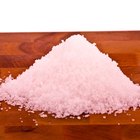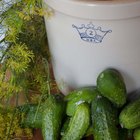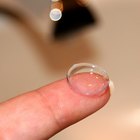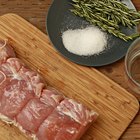
Healthy cucumbers, fresh spices, purified water and clean canning jars are all the elements you need to produce pickles in a clear brine. However, home canning operations are often relegated to tap water, dried spices and whatever cucumbers that made it out of the garden alive. These compromises in ingredients can produce problems in canning, such as cloudy pickles. The good news is that you can usually combat the cloudy pickle problem with items you have at home.
The Problem: Lactic Acid
Fermented pickles go through a slightly different process than fresh-pack pickles. The fermentation process uses bacteria to create the lactic acid that ferments the pickles. However, too much lactic acid can cause the brine to cloud. These cloudy pickles are still edible, but they look suspect. Fix this problem by pouring off the cloudy brine when processing and replacing it with a fresh batch.
The Problem: Hard Water
A common cause of cloudy pickles is the water that comes out of the tap. Hard water is full of minerals that can make the water cloudy. This doesn't make the pickles inedible -- you can eat them despite the hard water haze in the jar. Get a clear brine by softening the water on your own. Boil the water you need for pickling for about 15 minutes. Let it sit in a container for 24 hours. Pour out the water carefully, without disturbing the sediment at the bottom of the container. Once the sediment moves, stop pouring. Use the clear water for brine and discard the sediment water.
The Problem: Table Salt
The type of salt you use can cloud the pickle liquid. Table salt is not what most canners use, but it is the salt that causes cloudy pickles. The problem is the anti-caking agent in table salt that helps to keep the salt crystals from clumping in the shaker. This agent gets in brine and becomes a hazy mess. You can avoid this by using pickling salt. Cloudy pickles caused by table salt can be eaten, but the salt is not recommended for pickling.
The Problem: Bad Pickles
Spoilage is a common cause of cloudy pickles and also the reason many people simply throw out a cloudy jar of pickles without a second thought to other possible causes. Spoiled pickles are cloudy, but they also are accompanied by other signs. Bad pickles are mushy in texture, with a bad smell and flavor. The pickles or the brine may have black or brown spots. To fix this problem, review your processes. Spoilage originates with faulty sanitation, bad ingredients and improper packing. Fix these areas to help avoid your spoilage problem.
Related Articles

How to Use Sea Salt for Canning

How to Pickle in Stone Crocks

Can I Save Homemade Pickling Juice & ...

How to Store Contact Lenses Without ...

Uses of Saltpeter in Food

How Long Do Shucked Oysters Stay Fresh?

How to Cook a 1 1/2 Lbs Corned Beef ...

How to Brine Pork Roast
Adding Vinegar to a Brine for Pork
How to Pickle Without Vinegar
How to Ferment Watermelon

How to Bleach Your Vans

How Long Do I Let My Pickled Onions ...

Brine for a Deer Ham
How Long Can Canned Pickles Stay Good?

How to Clean Smelly Dress Shoes

Liquid Smoke Ingredients
How to Remove a Salty Taste From Sliced ...
Can You Freeze Capers?

How to Vacuum Seal Jars
References
Writer Bio
Jonita Davis is freelance writer and marketing consultant. Her work has appeared in various print and online publications, including "The LaPorte County Herald Argus" and Work.com. Davis also authored the book, "Michigan City Marinas," which covers the history of the Michigan City Port Authority. Davis holds a bachelor's degree in English from Purdue University.
Photo Credits
Jupiterimages/Photos.com/Getty Images